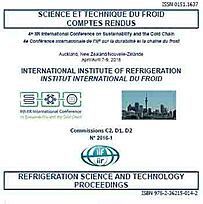
Document IIF
Incidences des scénarios d'utilisation des produits sur les performances environnementales des unités frigorifiques de transport routier.
Effects of product usage scenarios on environmental performance for road transport refrigeration units.
Auteurs : HESLOUIN C., STUMPF A., POURCHERESSE L., et al.
Résumé
A significant issue for the transport refrigeration industry is its high use of non-renewable energy for both motion and refrigeration. With the goal of reducing the environmental footprint, this study is focused on the Life Cycle Assessment (LCA) of Truck Refrigeration Units (TRU). Contrary to most studies about TRU, this study considers alternative impact categories, including energy consumption, refrigerant fluids and their associated impacts. The LCA reveals that the operation phase is a significant source of environmental impact, while the usage-scenario also has a high influence on the impact. The purpose of this paper is to demonstrate the weight of the transported product profile (frozen or fresh), type of transport (distribution or long haul) and the operating mode (continuous run, start/stop) on the environmental footprint of transport refrigeration. Finally, the LCA results highlight the necessity to consider the role of customer behavior on the environmental performance of transport refrigeration units.
Documents disponibles
Format PDF
Pages : 8
Disponible
Prix public
20 €
Prix membre*
Gratuit
* meilleur tarif applicable selon le type d'adhésion (voir le détail des avantages des adhésions individuelles et collectives)
Détails
- Titre original : Effects of product usage scenarios on environmental performance for road transport refrigeration units.
- Identifiant de la fiche : 30017554
- Langues : Anglais
- Sujet : Environnement
- Source : 4th IIR International Conference on Sustainability and the Cold Chain. Proceedings: Auckland, New Zealand, April 7-9, 2016.
- Date d'édition : 07/04/2016
- DOI : http://dx.doi.org/10.18462/iir.iccc.2016.0026
Liens
Voir d'autres communications du même compte rendu (63)
Voir le compte rendu de la conférence
Indexation
- Thèmes : Transport routier
- Mots-clés : Camion frigorifique; Transport routier; Consommation d'énergie; Performance; Environnement; Empreinte carbone; Cycle de vie
-
Factors affecting energy consumptions and carbo...
- Auteurs : MASTRULLO R., MAURO A. W., PANOZZO G.
- Date : 24/08/2019
- Langues : Anglais
- Source : Proceedings of the 25th IIR International Congress of Refrigeration: Montréal , Canada, August 24-30, 2019.
- Formats : PDF
Voir la fiche
-
Comparison of the environmental impact of HFC a...
- Auteurs : FABRIS F., FABRIZIO M., MARINETTI S., ROSSETTI A., MINETTO S.
- Date : 27/04/2023
- Langues : Anglais
- Source : 10th IIR Conference on Ammonia and CO2 Refrigeration Technologies.
- Formats : PDF
Voir la fiche
-
Innovative layout for electric powered refriger...
- Auteurs : ROSSETTI A., ARTUSO P., MINETTO S., et al.
- Date : 24/08/2019
- Langues : Anglais
- Source : Proceedings of the 25th IIR International Congress of Refrigeration: Montréal , Canada, August 24-30, 2019.
- Formats : PDF
Voir la fiche
-
Assessment of the energy savings generated by t...
- Auteurs : DEVIN E., CAVALIER G., FERTEL C.
- Date : 11/04/2022
- Langues : Anglais
- Source : 7th IIR International Conference on Sustainability and the Cold Chain (Online). Proceedings: April 11-13 2022
- Formats : PDF
Voir la fiche
-
Huella de carbono del transporte refrigerado.
- Auteurs : RASINES L., SAN MIGUEL G., ARTÉS-HERNÁNDEZ F., AGUAYO E.
- Date : 04/2022
- Langues : Espagnol
- Source : XI Congreso Ibérico y IX Congreso Iberoamericano de Ciencias y Técnicas del Frío, CYTEF 2022.
- Formats : PDF
Voir la fiche
